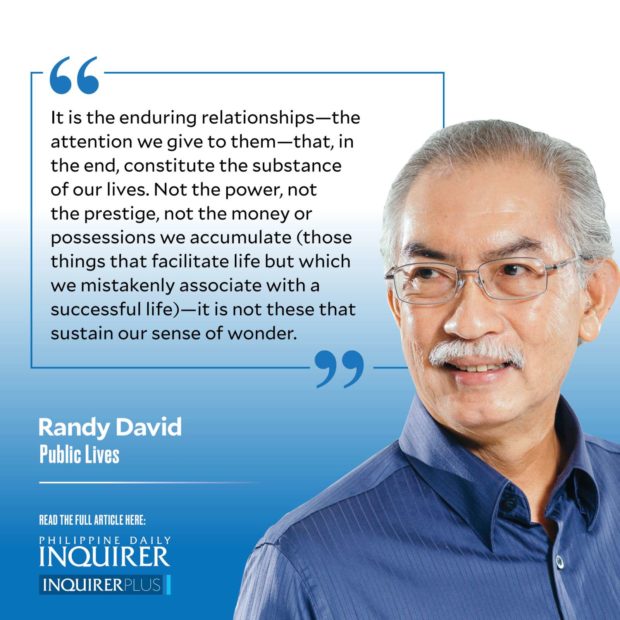Living, loving, and letting go
At the start of a new year, toward the end of your life, and in the midst of a pandemic, it is difficult not to feel anxious about time. You realize that life is absurdly short relative to the list of things you have set out to do. After 60, every passing year seems shorter than the one before it.
The year 2021 has been even more stark in its brevity. So much of it has been “stolen” by the pandemic. For almost two years now, lockdowns and restrictions on mobility have unmoored us from the life/work routines that, in normal times, gave us the illusion of time well spent. Thus, we envy those who have managed to carry on with their work and their lives with minimal disruption, or quickly adapted to the changed circumstances.
Article continues after this advertisementAt the back of this feeling is the tendency to equate meaningful life with being able to do more, or to get things done more efficiently, never mind if these are for pursuits you have not really chosen or decided as worth living for. Interestingly, when you look back and ask what your life’s purpose has been, such achievements tend to recede in importance.
The late American politician Paul Tsongas who represented Massachusetts in the US Senate memorably described the gladness he felt when he decided not to run for reelection after being diagnosed with a treatable form of cancer. “I used to walk my kids to school and think about reelection. Now I walk my kids to school and think about my kids … Somebody wrote me a letter and said, ‘Nobody on his deathbed ever said, I wish I’d spent more time on my business.’”
Indeed, even a philosopher as prolific as the late Richard Rorty did not think of the book projects that lay unfinished when, as he awaited death from pancreatic cancer, he was asked what he regretted most about not having enough time. He said, with a deadpan smile, that he wished he had spent more time reading poetry.
Article continues after this advertisement“This is not because I fear having missed out on truths that are incapable of statement in prose … Rather, it is because I would have lived more fully if I had been able to rattle off more old chestnut—just as I would have if I had made more close friends.”
It is the enduring relationships—the attention we give to them—that, in the end, constitute the substance of our lives. Not the power, not the prestige, not the money or possessions we accumulate (those things that facilitate life but which we mistakenly associate with a successful life)—it is not these that sustain our sense of wonder. “At the end of your life,” writes Oliver Burkeman in his ironic book “Four Thousand Weeks: Time Management for Mortals,” “whatever compelled your attention from moment to moment is simply what your life will have been.”
Listening to the audio version of Burkeman’s book while taking my afternoon walks these past few days, I thought of the three things that have bothered me since 2019 when the death of my wife Karina brought home to me the harsh reality of life’s non-negotiable finitude.
The first is precisely the question that Burkeman asks—how have you lived, or what endeavors have commanded your life’s finite attention? The second is: How have you loved and how much time have you given to the people who matter to you? And the third is: In the face of life’s brevity and uncertainty, have you learned to let go—not only of the things you always thought defined who you are—but, indeed, of the people you love?
I’m afraid I have come away from these questions feeling insecure, unworthy, and unprepared. I have tried and continue to try, no matter how late the hour may be, to live more purposefully, love better, and be more accepting of life’s wondrous impermanence. But I also continue to worry.
It’s comforting to hear Burkeman say that worrying is still the manifestation of a futile attempt to generate a feeling of security about the future “as if the very effort of worrying might somehow help forestall disaster.” This is obviously not a battle that the worrier can hope to win, he wisely counsels. “A life spent focused on achieving security with respect to time, when in fact such security is unattainable, can only ever end up feeling provisional…”
Because we have lost so many loved ones—relatives, friends, and colleagues—in this pandemic, nothing can ring truer than this about the nature of our relationship to time: that, at any point, the now is really all we have for the things we need to do, that tomorrow is uncertain, and we may not be around to express our love or to attend to those things that truly matter.
As tragic as this view of life may be, it is the only realistic way to live. This is how Burkeman counterintuitively sums it up: “If you can face the truth about time in this way — if you can step more fully into the condition of being a limited human — you will reach the greatest heights of productivity, accomplishment, service, and fulfillment that were ever in the cards for you to begin with. And the life you will see incrementally taking shape, in the rearview mirror, will be one that meets the only definitive measure of what it means to have used your weeks well: not how many people you helped, or how much you got done; but that working within the limits of your finite time and talents, you actually got around to doing—and made life more luminous for the rest of us by doing—whatever magnificent task or weird little thing it was that you came here for.”
Happy New Year!

















